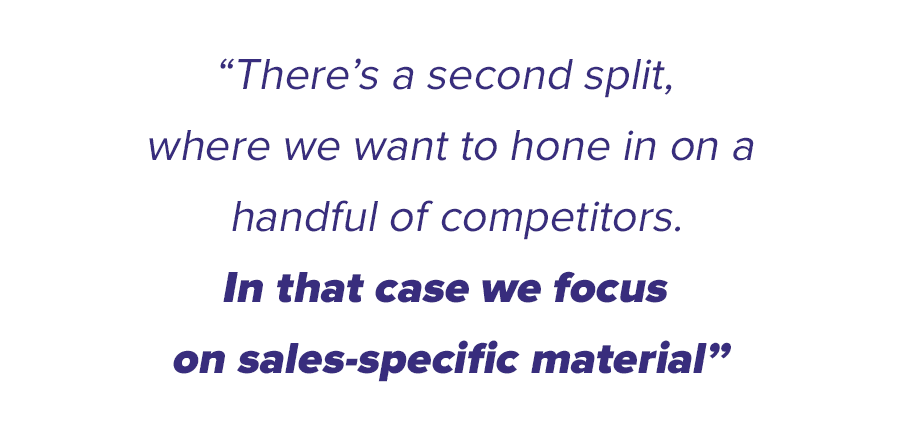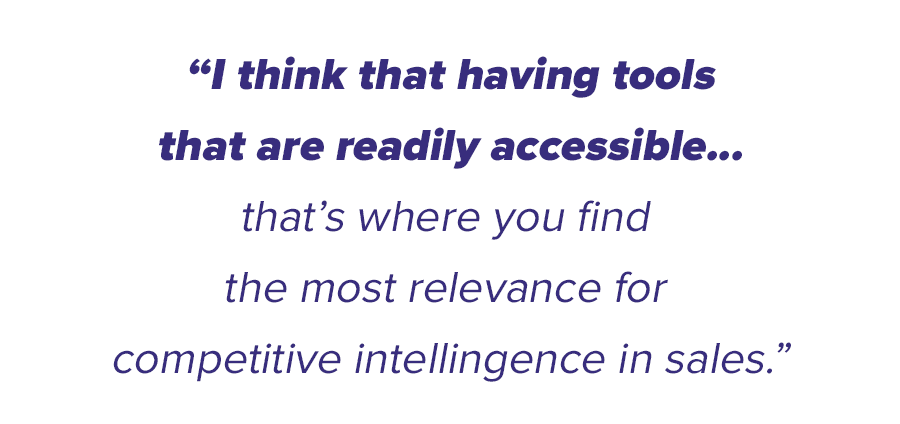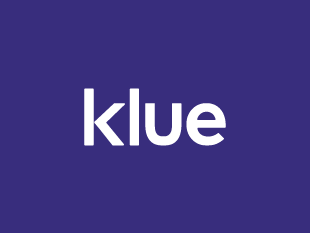Klue Compete
The Competitive Enablement Platform
Learn More
FIND OUT MORE >

In the space that I work in, there are thousands of companies. So usually, what happens is that a competitive team will be able to commit to focus on one or two competitors that are considered to be top competitors. That’ll work 50% or 60% of the time.
Where you really struggle with coverage is when you’re like us, and you sell to everybody
We have a different set of competitors: small businesses, enterprise, and even different competitors in financial services or retail. The coverage piece is a huge obstacle, and once you nail coverage then it’s about keeping it up-to-date.
We get a SWOT team wrapped around a competitor; a couple of sales engineers, a couple of long-term tech veterans like myself, and then two or three people that are familiar with the company that we’re looking at. Then, we’ll also bring in a product marketer to help with the tech stack.
The product marketer will own getting the content together and making sure that it’s organized, then we’ll put it in the repository that we use to collaborate.
When we run things like a new product introduction, or whether we’re making a change to something, we’ll start by looking at a category.
We’ll look at a landscape of 90 competitors, then narrow it down to 15 who are in our wheelhouse. Then segment out five that deserve a deep dive. The output of that would be a landscape where you’ll have shallow intel, but it’ll be an omnibus of what happens.
However, we do individually track any company that is a multi-product competitor in more depth.
Corporate competitive teams have a split focus. One focus is supporting C-suite and their decision-making by helping large company founders and VPs that want to understand their competitive landscape. They want a clear picture to understand company X, Y, and Z.
It’s not deal-specific, it’s more about the market rather than product and customer.
But then there’s a second split, where we really want to hone in on a handful of top competitors. In that case, we focus on sales-specific material.


If you’re in sales, CI relevance is all about being able to apply it to specific deal situations. Having a CI session in a boot camp, even though everybody says they want it, can be a complete waste of time. It’s just too much.
If you hire a new AE and she’s learning a new category, barely knows who the personas are, what use cases look like, then you try to put a bunch of competitors in her head? It doesn’t work.
I think that having tools that are readily accessible, easy to digest, really specific, and easily applied to deals… that’s where you find the highest relevance for competitive intelligence in sales.
On the other hand, sales engineers have more capacity to absorb a body of knowledge. No matter where I’ve worked I always find that they’re really good at sharing things with each other. They just do a good job of that as a community. As it’s a complicated job, they have to rely on their peers for best practices.


Where you really get the benefit of the competitive team is the legwork. We have roughly 55,000 employees, so if we’re looking at a competitor we can usually find twenty-five people who know the company well, or customers who are really keen on being helpful and will give us a deep dive.
They’ll do that legwork that we would never have the time to do as an ad hoc team.
Also, if you take a competitive intelligence job at Salesforce, you don’t have to guess what people want. Sales are pretty clear about what they want from you. It’s easier in a place like this.
I think it’s a whole lot harder for a company that doesn’t have a history or culture of competitive intelligence and doesn’t know what they want.
It’s going to get really, really competitive. When there’s lots of change, or companies are forced to fold, ten more pop up. It creates a lot more fractures in the marketplace.
I think there’s going to be a huge demand for competitive intelligence; enterprise software companies are getting challenged more than they ever have.
We used to only fight a battle at the top… we only fought these battles in one direction, which was up. Now we fight battles in two directions, in front of us and behind us.


Competitive Enablement
The topic of Large Language Models (LLMs) has a lot of confusion. Here's what you need to know about how Klue is working with them.


Competitive Enablement
Product Marketing
If your competitive intel game is too strong for automation, too pure for data privacy, and too rebellious for accuracy — then Klue AI is probably not for you.


Let’s do it. Tell us a bit about yourself and we’ll set up a time to wow you.
Let's do it. Tell us a bit about yourself and we'll set up a time to wow you.
XLet's do it. Tell us a bit about yourself and we'll set up a time to wow you.
XSubscribe to get our latest AI functionality and news in your inbox.
XOur Buyer Pulse feature, set to launch in Q2 2024, offers valuable insights into the factors influencing buyer decisions in your pipeline. By signing up for the waitlist, we can better gauge interest and proactively engage with you to streamline the setup and integration process before the feature becomes widely available.
X